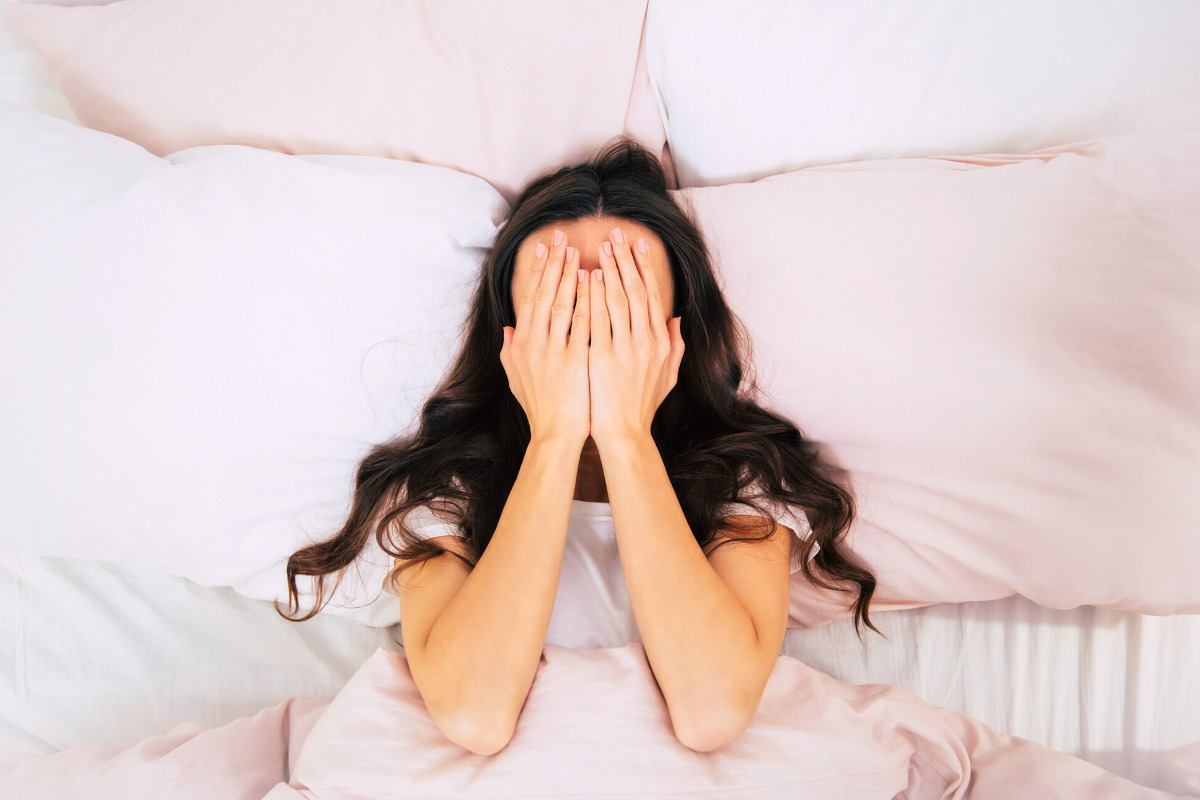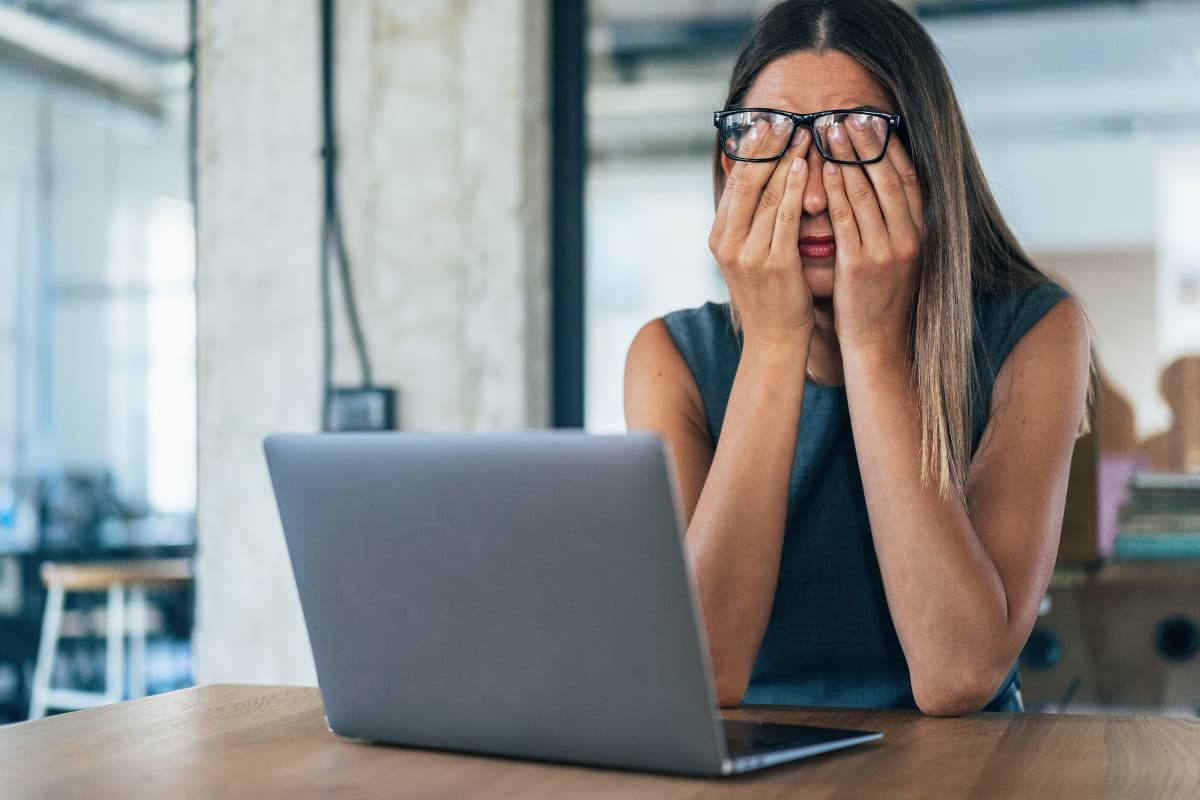How Menopause Affects Sleep (And What To Do About It)
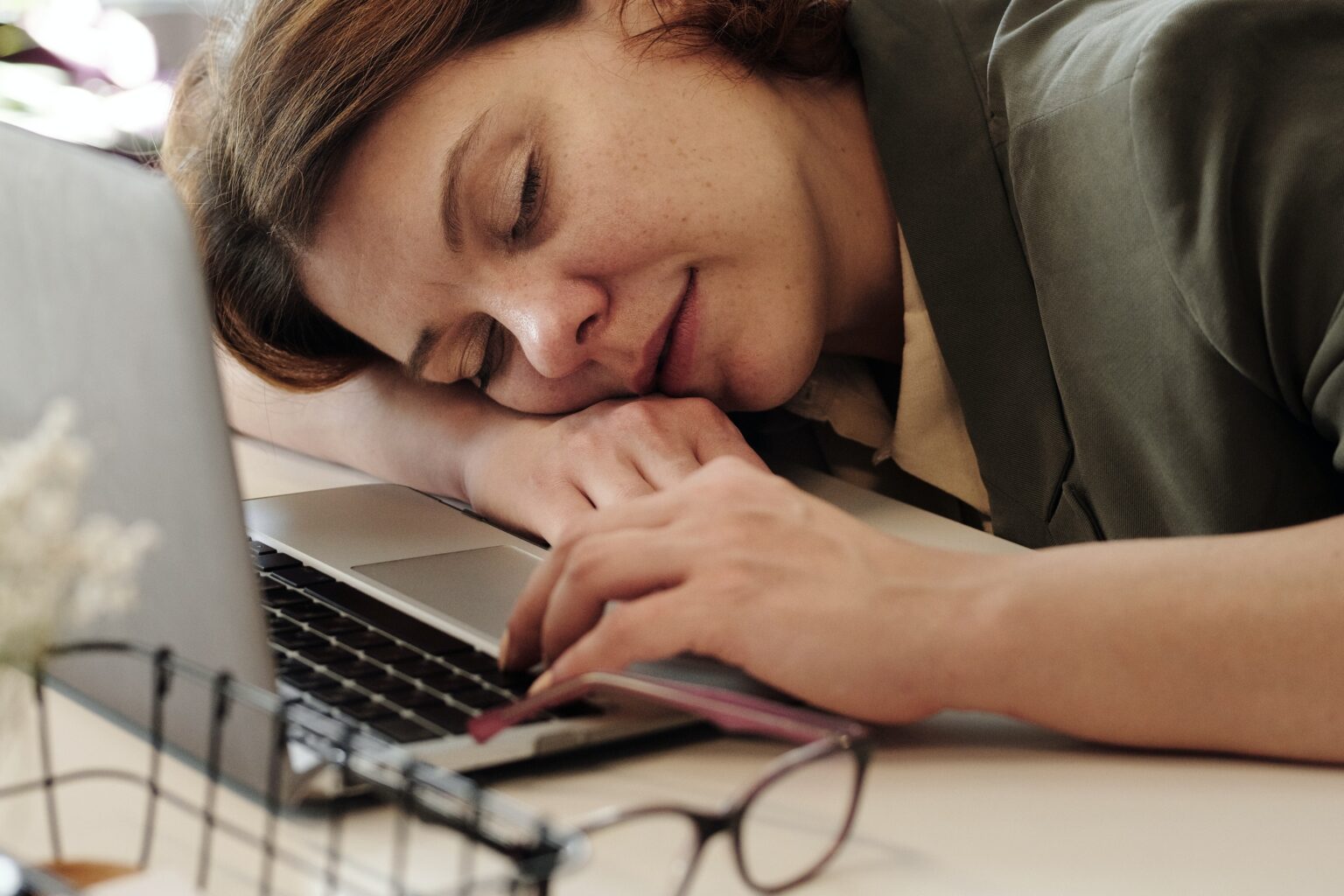
Insomnia and interrupted sleep are common complaints during perimenopause and menopause. Poor sleep caused by hot flashes and night sweats, and other menopause symptoms can affect your energy, mood, and even your long-term health. Luckily, strategies are available can help treat and prevent the ill effects of menopause-related sleep disturbance.
Sleep in Menopause
Unfortunately, sleep issues are common in menopause. In perimenopause, the prevalence of sleep disturbances reaches 39-47%, and in postmenopause, the numbers rise to 35-60%. Women in midlife get the least amount of sleep than any other group.
Sleep Issues Associated with Menopause
- Hot flashes and night sweats
- Insomnia
- Sleep apnea
- Snoring
- Early waking
How Does Menopause Affect Sleep?
Hot Flashes
Declining estrogen in the menopause life stage can affect sleep in various ways. One of the most obvious causes of interrupted sleep in menopause is hot flashes. The degree of sleep interruption can range from semi-consciously throwing the covers off and pulling them back on a few minutes later to fully waking up. Another reason women may wake up is night sweats. Hot flashes during sleep are also known as night sweats. It’s difficult to get a restful night of sleep when you wake up lying in a pool of sweat with clammy pj’s clinging to you once, twice, or more every night. For many women, night sweats are uncomfortable to the point of getting out of bed to shower or change out of damp night clothes and sheets. In that fully awakened state, falling back asleep can be a challenge.
Hypothalamus
Research has shown that low estrogen and low FSH (follicle-stimulating hormone) levels contribute to sleep disorders during the menopause transition. The precise mechanisms of why these hormone changes interfere with sleep are unknown, but experts suspect that the hypothalamic-pituitary-ovarian axis (HPO) is involved. The HPO axis, specifically the hypothalamus, is involved in sleep-wake cycles, and hormone changes likely interfere with its function.
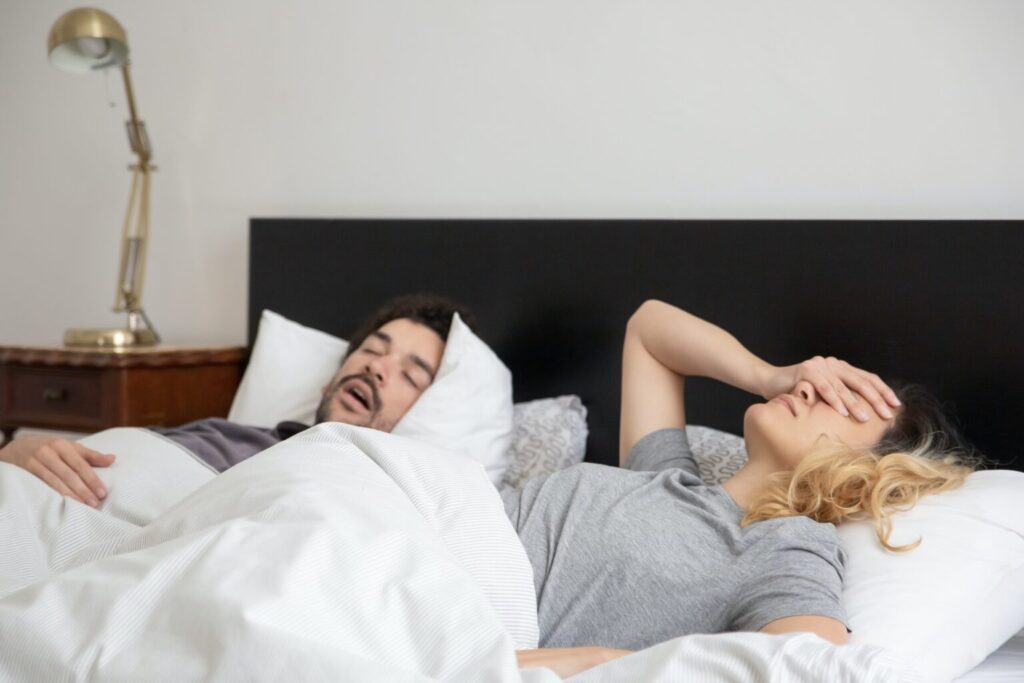
Snoring and Sleep Apnea
Other potential causes of sleep disturbance in menopause are snoring and sleep apnea. Sleep apnea is a potentially serious sleep disorder when you momentarily cease breathing in your sleep. This causes what’s referred to as micro-arousals. You might not wake up entirely, but your sleep will not be restful. Snoring and sleep apnea can lead to long-term health problems if left unchecked.
Low estrogen can cause inflammation and dryness in your nasal passages and a thickening of mucus, changes that can increase your risk of snoring. Menopause-related weight gain might also increase your risk of developing both snoring and apnea. Low progesterone and estrogen can also decrease muscle tone in your throat muscles, again increasing your risk for developing both snoring and sleep apnea.
Mood
Low estrogen is known to be a risk factor for worsening or new-onset anxiety and depression. Both mental health issues are known to interfere with sleep. Insomnia is a common finding with anxiety. Anxious thoughts may cause difficulty with falling asleep or staying asleep, and depression has been shown to interfere with the sleep-wake cycle.
How Much Sleep Do I Need?
Although it might sound like an unreachable goal to many people, the recommended amount of sleep for adults is 7-9 hours a night. Quantity is important, but the quality is even more so. If you sleep eight hours a night but wake up feeling fatigued, your sleep quality is not where it needs to be.
Research shows that sleep deprivation and poor sleep quality contribute to increased mortality, cardiovascular disease, diabetes, obesity, and cancer. Sleep should not be considered a luxury but an important fundamental component of your health and well-being.
Common Treatments for Sleep Issues
Sleep Hygiene
One of the first things you can do when faced with sleep issues is examine your sleep hygiene and adjust it to set yourself up for the best chance for a good night’s sleep. Experts make the following recommendations:
- Go to sleep at a consistent time every day
- Avoid caffeine, nicotine, and alcohol
- Eat early in the evening and avoid heavy foods
- Exercise (but not too close to bedtime)
- Lower stress levels through mind-body practices and soothing rituals
- Minimize daytime napping
- Put away all digital devices two hours before bedtime
- Sleep in a cool, dark, quiet room
- Wear breathable, moisture-wicking sleepwear
CBT-I (Cognitive Behavioral Therapy for Insomnia)
CBT-I takes some time and effort to reach its full impact, but it is one of the most effective treatment options for sleep issues like insomnia. It is a holistic, safe, and drug-free way to address sleep issues by consciously identifying and replacing thoughts that play a role in your sleep disorder. Trained therapists provide CBT-I and there are now apps for CBT-I. Your insurance may cover the treatment.
Hypnotherapy
Hypnotherapy is another safe and drug-free way to combat sleep difficulties. It can help you fall asleep, stay asleep, and stay in a regenerative deep sleep for longer periods of time. Hypnotherapy is an excellent tool to help relax the body and mind before sleep. You can use the Midday app for menopause-specific hypnotherapy programs for sleep as well as relief from hot flashes and night sweats and anxiety.
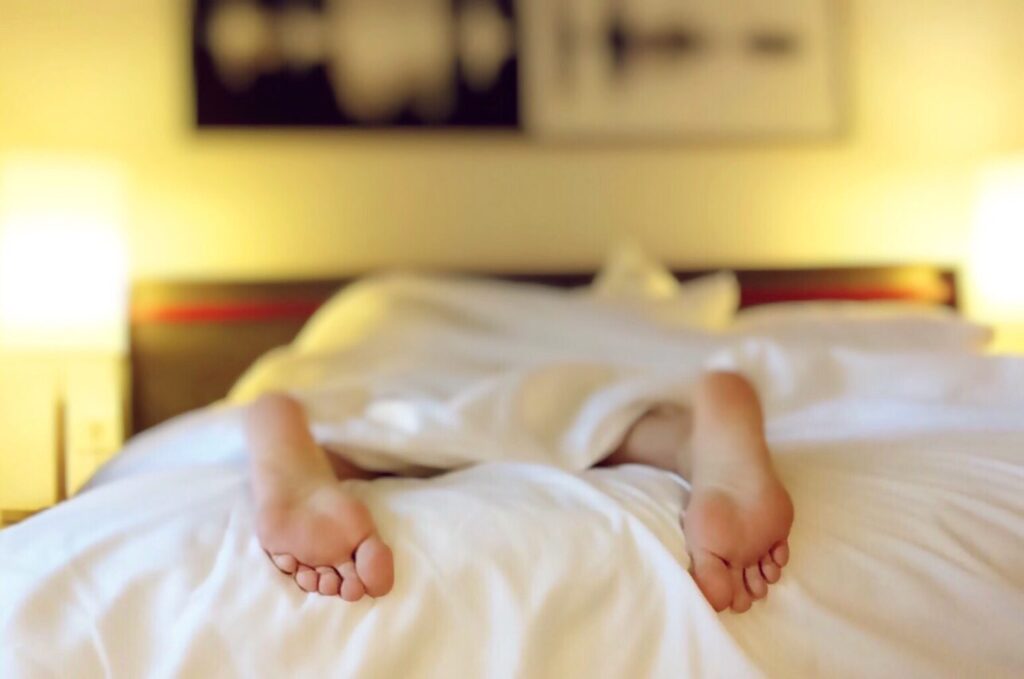
Progressive Muscle Relaxation and Deep Breathing
Progressive muscle relaxation is the practice of tensing and relaxing your muscles. Deep breathing is when you breathe in an intentional pattern. There are many methods of deep breathing to choose from.
Both progressive muscle relaxation and deep breathing can help soothe your body and lower stress and anxiety before bed. Adding one or both practices to your bedtime ritual can help signal to your brain that it’s time to slow down and relax in preparation for sleep.
Prescription Sleep Aids
If other approaches haven’t given you the relief you’re looking for, you can talk to your primary care provider about prescription sleeping pills. In the short term, they can help you get a good night’s sleep. Keep in mind the potential for side effects, however. Sleepiness, sluggishness, gastrointestinal upset, allergic reactions, mental confusion, and more have been reported.
MHT (Menopausal Hormone Therapy)
MHT can lessen and even eliminate the occurrence of hot flashes caused by low estrogen levels. When the body has more estrogen available, hot flashes and night sweats can become a thing of the past, and your sleep becomes less disturbed as a result.
CPAP
CPAP (or continuous positive airway pressure) machines are considered the gold-standard treatment for sleep apnea. When using a CPAP machine, you wear a mask that delivers pressurized air into your nose and mouth, keeping your airways open as you sleep. You might experience a dry nose and mouth or skin irritation while using CPAP, but it’s a small price to pay for what could be a life-saving treatment.
Sleep Well
Sleep disturbances caused by menopause must be taken seriously and addressed as soon as possible. Protecting your sleep will improve your quality of life and help you stay healthy long after menopause.
Download the Midday menopause app for more tips and expert advice to help you get a better night’s sleep tonight.
Jennifer Turkyilmaz, RN, BSN, is a medical writer who worked for many years in women’s health as a high-risk pregnancy nurse. She is also a newly menopausal woman who wishes she had known more about what to expect before it happened to her.
Sign up for more unique women’s health content
By submitting this form, you agree to the Lisa Health Privacy Policy and Terms of Use
